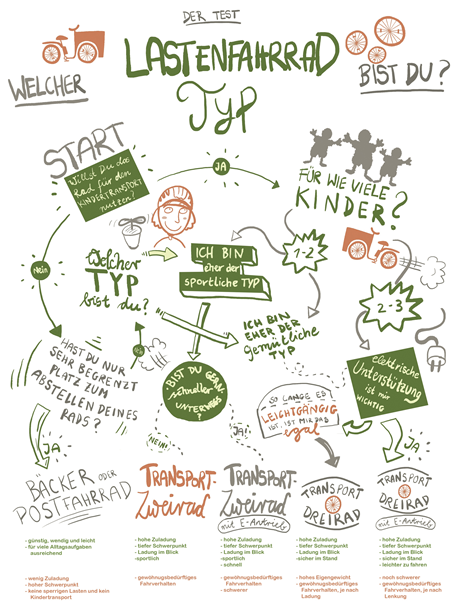- Topic
- Mobility management
- Public and stakeholder involvement
- Country
- Germany
- Resource type
- Case study
First published on 24 June 2020.
Every year, the LA 21 Working group “Climate protection and Mobility” of the City of Rostock in cooperation with many partners, organises a car-free day in September.
The event is called “Climate Action Day” (Klimaaktionstag). For one day, the centrally located, four-lane street “Lange Straße” is closed for stationary and floating traffic and redesigned into a car-free street with a fair at which local organisations, initiatives and, associations dealing with the topic of climate protection can present themselves. Any local partner can apply for a stand in one of the parking pockets. The staff unit for mobility management which is responsible for the planning and implementation of the mobility points in the framework of cities.multimodal, used their parking pocket stand as a place to get the people's feedback on cargo bikes.
In action
During the planning phase of the mobility points in 2018, the staff unit for mobility management prepared the terms of reference for the tender “Operation of a full-automatic cargo bike sharing system”. In order to get to know what types of cargo bikes (two-wheeled, three-wheeled, with or without electric assistance etc.) that might be most suitable for a cargo bike-sharing system, the staff unit organised a survey and a cargo bike test at their stand on the Climate Action Day, 16 September 2018. Planning for the survey and cargo bike test took approximately one week. People were invited to first do a poster survey and then afterward they could physically test different types of cargo bikes. The aim was to see which cargo bikes can be handled intuitively and what type of bike and cargo box the people deemed most useful - and would, therefore, be more likely to want to use.
From noon until 5 o’clock in the afternoon during the city's Climate Action Day, people were invited to come to the parking pocket stand and partake in the survey and bike test. In preparation, a graphic designer was hired to prepare a poster with some short survey questions. The guiding question was “What cargo bike type are you?”.
The staff unit for mobility management rented different cargo bikes for the Climate Action Day from a local cargo bike dealer. Moreover, the staff unit prepared the parking pocket stand with different materials (flipchart, table, beach flag, info material, poster, cargo bikes) on the day of the event. Two employees from the staff unit occupied the stand, conducted the surveys, and provided the cargo bikes to people who were interested in trying them out. The target group was the more than 1,000 people of Rostock that visited Climate Action Day which is a well-known annual event in Rostock that was first organised 10 years ago.
The main communication channels for informing locals about the event are press releases, articles on the city’s website, press articles and the website. No specific communication to promote the cargo bike test was made, besides the stand itself. The budget required for the parking pocket stand, survey and cargo bike test was very small. No fees for the stand were paid and the graphic designer worked on a voluntary basis. Only a rent of €50 for the cargo bikes had to be paid by the cities.multimodal project. However, it is necessary to note that the costs for organising the car-free day with 60 stands and more than 1000 visitors are excluded. These are covered by the municipality.
Results
Results of the poster survey were recorded visually as people used stickers to demonstrate which cargo bike type they preferred. The survey showed that two-wheel e-cargo bikes were the most popular. The physical test showed that even though three-wheeled cargo bikes seem to be more stable and safe, they are quite difficult to ride. Notes were also taken from verbal feedback given by the bike testers. The outcomes of these tests were used to decide on the type of cargo bike that was requested in the terms of reference for the tender “Operation of a full-automatic cargo bike sharing system”. Media coverage of the Climate Action Day activities was excellent and many press and newspaper articles were published about it.
Challenges, opportunities and transferability
A piece of general advice might be that it is crucial to test such new mobility solutions like cargo bikes or e-scooters before the procurement is done. It's advisable to ask people to test these new vehicles for themselves as they will be the final users and come from all different perspectives – for example, some might be experienced drivers, some not. Local residents can give fruitful recommendations and informative feedback. Furthermore, the testing allowed the city to promote future mobility points and the upcoming cargo bike-sharing system at the same time. The easiest way to conduct such a test is to use established events and organise a stand. It is necessary to select an event that the main target groups are likely to attend.
In Depth
This case study was created as a part of the cities.multimodal project and based on a report by Lisa Wiechmann, Project coordinator “cities.multimodal”, staff unit mobility management, Senator’s office for construction and environment — Hanseatic and University City of Rostock.

